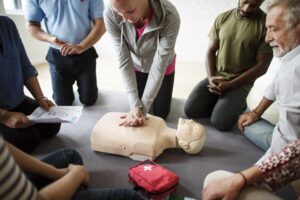Security is more than a profession; it’s a responsibility that demands vigilance, training, and legal compliance. If you’re considering a career as a patrol guard in New South Wales, completing a patrol guard training course is essential. Whether you aim to work in corporate security, event management, or private patrol services, proper patrol guard training equips you with the skills, knowledge, and confidence to excel.
In this ultimate guide, we break down everything you need to know about patrol guard training courses, from the skills you’ll gain to career opportunities and licence application tips.
By the end, you’ll understand why training is the first step toward a successful and rewarding security career.
Table of Contents
ToggleWhy Patrol Guard Training is Essential in NSW
Patrol guards play a crucial role in maintaining safety across residential, commercial, and public spaces. The NSW Government mandates that all security personnel hold valid certification, emphasizing that training is not optional—it’s the law.
Without formal patrol guard training, you risk:
- Failing to meet legal compliance
- Inadequate response to emergencies or incidents
- Reduced employability and career growth
A certified patrol guard training course ensures you are prepared for real-world scenarios, including conflict management, emergency handling, and risk assessment. It’s also the gateway to applying for your security licence in NSW, which employers require before you can begin professional security work.
Pro Tip: Choose accredited training centres like Multisec Training that offer hands-on instruction and industry-recognized certification.
Key Components of a Patrol Guard Training Course
A professional patrol guard training course combines theoretical knowledge with practical skills. Let’s break down the key components that every trainee should expect:
1. Legal Knowledge and Compliance
Understanding the legal framework is critical for any security professional. A comprehensive course covers:
- NSW security industry regulations
- Patrol guard responsibilities under the law
- Reporting standards and documentation requirements
Knowing the legal boundaries ensures you operate safely, ethically, and professionally.
2. Risk Assessment and Situational Awareness
Effective patrol guards anticipate threats before they escalate. Training includes:
- Conducting routine safety audits
- Identifying potential hazards or security breaches
- Preventive measures to mitigate risks
With these skills, you can proactively protect property, staff, and the public.
3. Conflict Resolution and Communication Skills
Security professionals frequently encounter disputes or tense situations. Training teaches:
- Verbal de-escalation techniques
- Maintaining authority without aggression
- Clear and concise reporting to supervisors or authorities
Strong communication helps reduce incidents and ensures smooth operations.
4. Emergency Response and First Aid
Patrol guards are often first responders. Courses cover:
- Basic first aid and CPR
- Fire safety procedures and evacuation plans
- Coordinating with local emergency services
Being prepared for emergencies is not just beneficial—it’s a legal responsibility.
5. Practical Patrol Techniques
Hands-on training forms the core of patrol guard training. Participants learn:
- Conducting systematic patrols
- Monitoring CCTV and alarm systems
- Incident documentation and reporting
Practical drills simulate real-life situations, allowing trainees to gain confidence and experience before starting professional work.
How to Choose the Right Patrol Guard Training Course
Choosing the right course is critical to your success. Here’s what to look for when selecting a patrol guard training course in NSW:
- Accreditation: Ensure the course is recognized by NSW security authorities
- Experienced Trainers: Instructors should have real-world experience in security operations
- Practical Focus: Look for courses with hands-on simulations of patrolling and emergency response
- Flexible Learning: Options for online modules or blended learning can make training accessible
We offer an accredited program that combines theory with practical exercises, ensuring trainees are fully prepared for a career in security.
Step-by-Step Guide to Completing Patrol Guard Training
Step 1: Enrol in a Course
Begin by selecting a reputable provider and enrolling in an accredited patrol guard training course.
Step 2: Complete Coursework and Practical Training
Attend both theoretical sessions and practical drills. Focus on understanding NSW laws, emergency procedures, and patrol techniques.
Step 3: Assessment and Evaluation
Courses typically end with a competency assessment to ensure trainees can perform essential duties effectively.
Step 4: Receive Certification
Upon successful completion, you receive a certificate, which is required to apply for a security licence in NSW.
Step 5: Apply for a Security Licence
With your certification, you can submit your security licence application. Make sure you have:
- Proof of course completion
- Valid ID and residency documents
- Background checks or criminal history clearance
Career Paths After Completing Patrol Guard Training
A certified patrol guard training course opens a variety of career opportunities:
- Corporate Security Officer: Protect businesses, staff, and assets
- Event Security Guard: Ensure safety at concerts, festivals, and private events
- Residential Patrol Officer: Monitor estates and gated communities
- Private Security Consultant: Advise on risk management, threat assessment, and security strategy
With experience and additional certifications, you can progress to supervisory or management roles within the security industry.
Benefits of Completing a Patrol Guard Training Course
1. Legal Compliance
You meet NSW security requirements and avoid fines or legal penalties.
2. Increased Employability
Employers prefer certified guards because it demonstrates professionalism and competence.
3. Skill Development
Training enhances practical skills in surveillance, emergency response, and conflict resolution.
4. Career Growth
Certified guards are more likely to secure higher-paying positions and advancement opportunities.
Tips for Maximizing Your Training
- Engage Actively in Practical Sessions: Hands-on drills prepare you for real-world scenarios.
- Stay Updated on NSW Security Laws: Regulations change; knowing them keeps you compliant.
- Practice Situational Awareness: Observe and assess during drills to build instinctive skills.
- Network with Peers and Trainers: Connections in the security industry can lead to job opportunities.
External Resources
- NSW Police Security Licensing – Official licensing information
- Australian Security Industry Association Ltd (ASIAL) – Professional development and industry updates
Enrol in Patrol Guard Training Today
If you’re planning to have a career in security, completing a patrol guard training course is your first step. Gain practical skills, earn your certification, and open doors to diverse opportunities in Sydney and NSW.
Call out team at 1300 756 533 and take your first step towards a successful career.





